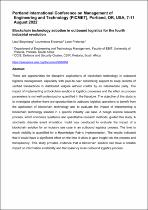 ResearchSpace
ResearchSpace
Blockchain technology adoption in outbound logistics for the fourth industrial revolution
JavaScript is disabled for your browser. Some features of this site may not work without it.
- ResearchSpace
- →
- Research Publications/Outputs
- →
- Conference Publications
- →
- View Item
| dc.contributor.author |
Steynberg, L

|
|
| dc.contributor.author |
Erasmus, Louwrence D

|
|
| dc.contributor.author |
Pretorius, L

|
|
| dc.date.accessioned | 2023-01-17T06:08:30Z | |
| dc.date.available | 2023-01-17T06:08:30Z | |
| dc.date.issued | 2022-08 | |
| dc.identifier.citation | Steynberg, L., Erasmus, L.D. & Pretorius, L. 2022. Blockchain technology adoption in outbound logistics for the fourth industrial revolution. http://hdl.handle.net/10204/12571 . | en_ZA |
| dc.identifier.isbn | 978-1-890843-41-0 | |
| dc.identifier.isbn | 978-1-6654-5152-9 | |
| dc.identifier.uri | DOI: 10.23919/PICMET53225.2022.9882858 | |
| dc.identifier.uri | http://hdl.handle.net/10204/12571 | |
| dc.description.abstract | There are opportunities for disruptive applications of blockchain technology in outbound logistics management, especially with peer-to-peer networking support to keep records of verified transactions in distributed ledgers without control by an intermediate party. The impact of implementing a blockchain solution in logistics processes and the effect on process parameters is not well understood or quantified in the literature. The objective of this study is to investigate whether there are opportunities in outbound logistics operations to benefit from the application of blockchain technology and to evaluate the impact of implementing a blockchain technology solution in a specific industry use case. A design science research process, which combines qualitative and quantitative research methods, guided this study. A stochastic discrete event simulation model was developed to evaluate the impact of a blockchain solution for an industry use case in an outbound logistics process. The time to reach visibility is quantified for a Hyperledger Fabric implementation. The results indicated that it would have a significant effect on the time it takes to gain insight into the process and transparency. This study provides evidence that a blockchain solution can have a notable impact on information availability and transparency in an outbound logistics process. | en_US |
| dc.format | Abstract | en_US |
| dc.language.iso | en | en_US |
| dc.relation.uri | https://ieeexplore.ieee.org/document/9882858 | en_US |
| dc.source | Portland International Conference on Management of Engineering and Technology (PICMET), Portland, OR, USA, 7-11 August 2022 | en_US |
| dc.subject | Blockchain | en_US |
| dc.subject | Fourth Industrial Revolution | en_US |
| dc.subject | Information availability | en_US |
| dc.subject | Outbound logistics | en_US |
| dc.subject | Simulation | en_US |
| dc.title | Blockchain technology adoption in outbound logistics for the fourth industrial revolution | en_US |
| dc.type | Conference Presentation | en_US |
| dc.description.pages | 11pp | en_US |
| dc.description.note | ©2022 PICMET. Due to copyright restrictions, the attached PDF file only contains the abstract of the full text item. For access to the full text item, please consult the publisher's website: https://ieeexplore.ieee.org/document/9882858 | en_US |
| dc.description.cluster | Defence and Security | en_US |
| dc.description.impactarea | Command Control and Integrated Systems | en_US |
| dc.identifier.apacitation | Steynberg, L., Erasmus, L. D., & Pretorius, L. (2022). Blockchain technology adoption in outbound logistics for the fourth industrial revolution. http://hdl.handle.net/10204/12571 | en_ZA |
| dc.identifier.chicagocitation | Steynberg, L, Louwrence D Erasmus, and L Pretorius. "Blockchain technology adoption in outbound logistics for the fourth industrial revolution." <i>Portland International Conference on Management of Engineering and Technology (PICMET), Portland, OR, USA, 7-11 August 2022</i> (2022): http://hdl.handle.net/10204/12571 | en_ZA |
| dc.identifier.vancouvercitation | Steynberg L, Erasmus LD, Pretorius L, Blockchain technology adoption in outbound logistics for the fourth industrial revolution; 2022. http://hdl.handle.net/10204/12571 . | en_ZA |
| dc.identifier.ris | TY - Conference Presentation AU - Steynberg, L AU - Erasmus, Louwrence D AU - Pretorius, L AB - There are opportunities for disruptive applications of blockchain technology in outbound logistics management, especially with peer-to-peer networking support to keep records of verified transactions in distributed ledgers without control by an intermediate party. The impact of implementing a blockchain solution in logistics processes and the effect on process parameters is not well understood or quantified in the literature. The objective of this study is to investigate whether there are opportunities in outbound logistics operations to benefit from the application of blockchain technology and to evaluate the impact of implementing a blockchain technology solution in a specific industry use case. A design science research process, which combines qualitative and quantitative research methods, guided this study. A stochastic discrete event simulation model was developed to evaluate the impact of a blockchain solution for an industry use case in an outbound logistics process. The time to reach visibility is quantified for a Hyperledger Fabric implementation. The results indicated that it would have a significant effect on the time it takes to gain insight into the process and transparency. This study provides evidence that a blockchain solution can have a notable impact on information availability and transparency in an outbound logistics process. DA - 2022-08 DB - ResearchSpace DP - CSIR J1 - Portland International Conference on Management of Engineering and Technology (PICMET), Portland, OR, USA, 7-11 August 2022 KW - Blockchain KW - Fourth Industrial Revolution KW - Information availability KW - Outbound logistics KW - Simulation LK - https://researchspace.csir.co.za PY - 2022 SM - 978-1-890843-41-0 SM - 978-1-6654-5152-9 T1 - Blockchain technology adoption in outbound logistics for the fourth industrial revolution TI - Blockchain technology adoption in outbound logistics for the fourth industrial revolution UR - http://hdl.handle.net/10204/12571 ER - | en_ZA |
| dc.identifier.worklist | 26170 | en_US |





